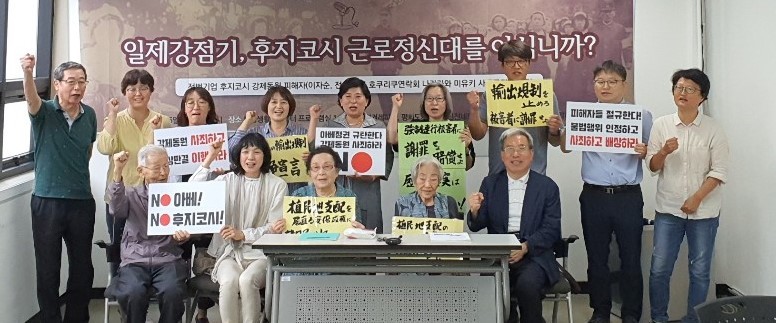 |
|
Miyuki Nakagawa, secretary-general of the Hokuriku Group, a Japanese nonprofit organization that has supported lawsuits by victims of the Korean Women’s Volunteer Labor Corps during the Japanese colonial occupation, meets forced labor victims in Incheon on Sept. 5. (Lee Jung-ha)
|
Support group for Korean victims of forced labor direct criticism at Abe administration
“The responsibility for compulsory mobilization during the Japanese colonial occupation lies fully with the Japanese government. I feel the heavy weight of responsibility as a Japanese person,” Miyuki Nakagawa told the Hankyoreh on Sept. 5. Nakagawa is secretary-general of the Hokuriku Group, a Japanese nonprofit organization that funds lawsuits by victims of the Korean Women’s Volunteer Labor Corps during the Japanese colonial occupation. The 200 members of the Hokuriku Group have pooled their resources to fund collective lawsuits by people who were press-ganged and forced to work for Nachi-Fujikoshi, a company guilty of war crimes during the Japanese colonial occupation. Nachi-Fujikoshi was the Japanese company that mobilized the largest number of workers from the Women’s Volunteer Labor Corps. 1,089 teenage girls between the ages of 10 and 15 were put to work at the company’s munitions factory in Toyama between 1944 and 1945. On Thursday, Nakagawa met two of the members of the Korean Women’s Volunteer Labor Corps who performed force labor at the Toyama factory, in Japan’s Hokuriku region: Lee Ja-sun, 87, and Chun Ok-nam, 89. The meeting took place at the Bupyeong Living and Culture Center, in Incheon. “There are fewer and fewer opportunities to meet these victims, since they’re all getting older. I made this visit so that I could meet another victim, hear her story, and offer comfort before it’s too late,” Nakagawa said, when asked about the purpose of her visit to South Korea. Nakagawa also voiced criticism of the Japanese government, currently led by Prime Minister Shinzo Abe. “The Abe administration’s attempt to meddle in a decision [about compensation for forced labor] made by another country’s Supreme Court is unthinkable in a country with the division of powers,” the activist said. Nakagawa offered the following thoughts about the South Korean boycott of Japanese products. “The current conflict between South Korea and Japan derives from Japan’s failure to take responsibility for its colonial occupation. [Collective action by South Koreans] isn’t a rejection of Japanese society; it’s a refusal to forgive the Abe administration,” she said. “Even many South Koreans aren’t aware of how these women suffered during their forced labor in Nachi-Fujikoshi. We need to help these women leave a record of their experiences,” Nakagawa said, as she concluded her remarks. Lee Ja-sun and Chun Ok-nam told the painful story of being taken to Japan and subjected to forced labor. “Every day was a struggle against starvation, and when we went home, we weren’t given a single cent of our wages,” said Lee, who was taken to Japan with 49 other female classmates at the age of 13. Chun said that she hurt her finger while making bearings and that the injury still caused her pain today. “The problem was that we weren’t able to defend our country. We mustn’t let our country be taken from us again,” she said. Lee and Chun are among 28 victims who filed a damages lawsuit against Nachi-Fujikoshi in February 2013. Thus far, their lawsuit has been successful both in the first instance and on appeal, and they’re currently waiting for the final ruling by the Supreme Court. In 2003, the group filed a damages lawsuit against Nachi-Fujikoshi in a district court in Toyama, but the court ruled against the plaintiffs on the ground that the individual right to make claims had been nullified by a 1965 agreement in which South Korea and Japan settled outstanding claims. In 2011, the Japanese Supreme Court rejected their appeal. But after the South Korean Supreme Court ruled in a damages lawsuit filed by victims of Nippon Steel that the individual right to make claims hadn’t expired, the victims filed a new lawsuit in South Korea. “The first lawsuits for damages resulting from forced labor were filed in Japan. The first people to roll up their sleeves and get involved were the members of the Hokuriku Group. We need to work with healthy members of Japanese civil society, such as this group, as we seek a way to resolve the conflict between our two countries,” said An Yeong-suk, co-president of a South Korean civic group that supports domestic lawsuits by victims of the Korean Women’s Volunteer Labor Corps. By Lee Jung-ha, Incheon correspondent Please direct comments or questions to [english@hani.co.kr] Caption:






